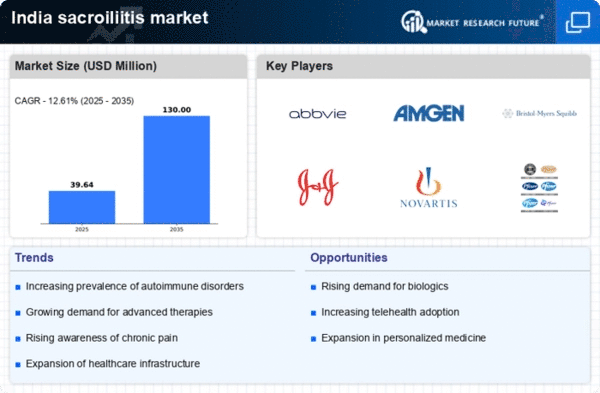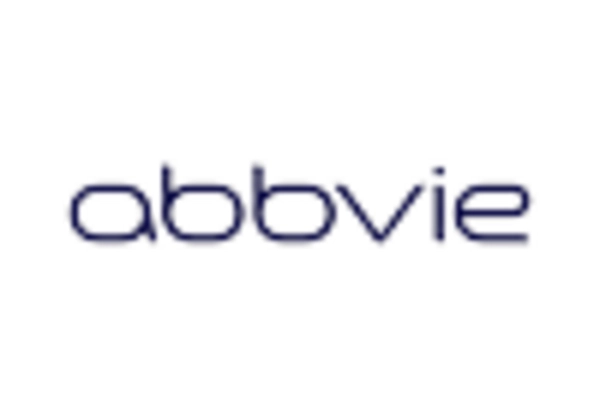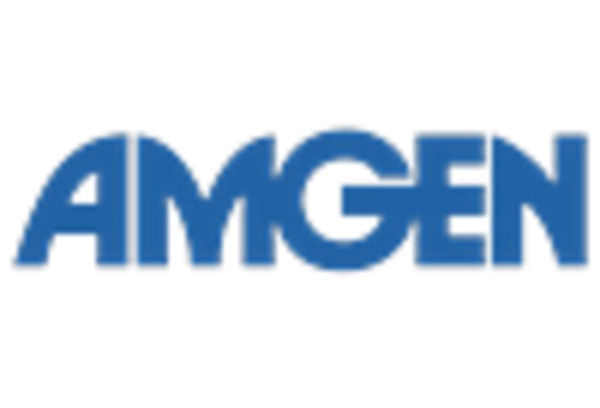Increasing Prevalence of Sacroiliitis
The rising incidence of sacroiliitis in India is a crucial driver for the sacroiliitis market. Factors such as sedentary lifestyles, obesity, and an aging population contribute to this trend. Recent studies indicate that the prevalence of sacroiliitis among adults has increased by approximately 15% over the past decade. This growing patient population necessitates enhanced diagnostic and therapeutic options, thereby stimulating market growth. As healthcare providers become more aware of the condition, the demand for effective treatments is likely to rise. Consequently, pharmaceutical companies and healthcare institutions are focusing on developing innovative solutions tailored to the needs of patients suffering from sacroiliitis. This trend is expected to create a robust market environment, fostering competition and investment in research and development within the sacroiliitis market.
Technological Advancements in Diagnostics
Technological innovations in diagnostic tools are transforming the landscape of the sacroiliitis market in India. Advanced imaging techniques, such as MRI and CT scans, have significantly improved the accuracy of sacroiliitis diagnosis. The integration of artificial intelligence in radiology is also enhancing the speed and precision of diagnostic processes. As these technologies become more accessible, healthcare providers are likely to adopt them, leading to earlier detection and treatment of sacroiliitis. This shift is expected to increase the demand for related therapeutic options, thereby driving market growth. Moreover, the rise of telemedicine platforms allows for remote consultations, further facilitating timely diagnosis and management of sacroiliitis. Consequently, the ongoing advancements in diagnostic technologies are poised to have a profound impact on the sacroiliitis market.
Government Initiatives and Healthcare Policies
Government initiatives aimed at improving healthcare access and quality in India play a significant role in shaping the sacroiliitis market. Policies that promote early diagnosis and treatment of musculoskeletal disorders are increasingly being implemented. For instance, the National Health Mission has been instrumental in enhancing healthcare infrastructure, which facilitates better access to diagnostic services for sacroiliitis. Furthermore, the introduction of health insurance schemes has made treatments more affordable for patients, potentially increasing the number of individuals seeking care. As a result, the market is likely to experience growth driven by increased patient engagement and treatment adherence. These initiatives not only improve patient outcomes but also encourage pharmaceutical companies to invest in the development of new therapies, thereby expanding the sacroiliitis market.
Growing Focus on Patient Education and Support
The emphasis on patient education and support systems is becoming increasingly relevant in the sacroiliitis market. Healthcare providers are recognizing the importance of empowering patients with knowledge about their condition and treatment options. Educational programs and support groups are being established to help patients manage their symptoms effectively. This focus on education is likely to enhance treatment adherence and improve patient outcomes, which in turn could drive demand for various therapeutic options. Furthermore, as patients become more informed, they may actively seek out advanced treatments, thereby influencing market dynamics. The integration of digital platforms for patient education is also on the rise, providing accessible resources for individuals affected by sacroiliitis. Consequently, the growing emphasis on patient education and support is expected to play a pivotal role in shaping the future of the sacroiliitis market.
Rising Demand for Non-Invasive Treatment Options
The growing preference for non-invasive treatment modalities is emerging as a significant driver in the sacroiliitis market. Patients are increasingly seeking alternatives to traditional surgical interventions due to concerns about recovery time and potential complications. Non-invasive therapies, such as physical therapy, corticosteroid injections, and biologics, are gaining traction among healthcare providers and patients alike. Market data suggests that the demand for biologic therapies has surged by approximately 20% in recent years, reflecting a shift towards more patient-centric treatment approaches. This trend is likely to encourage pharmaceutical companies to invest in research and development of innovative non-invasive therapies, thereby expanding the range of options available for managing sacroiliitis. As a result, the sacroiliitis market is expected to witness substantial growth driven by this evolving treatment landscape.
















